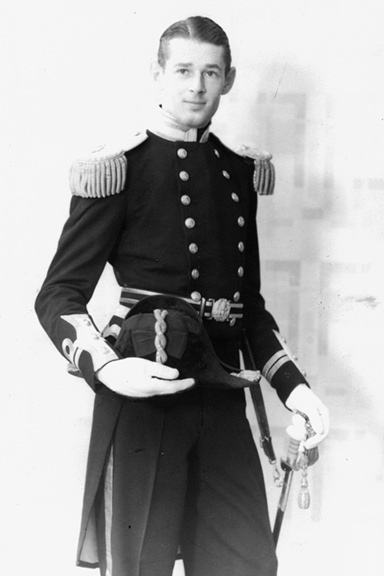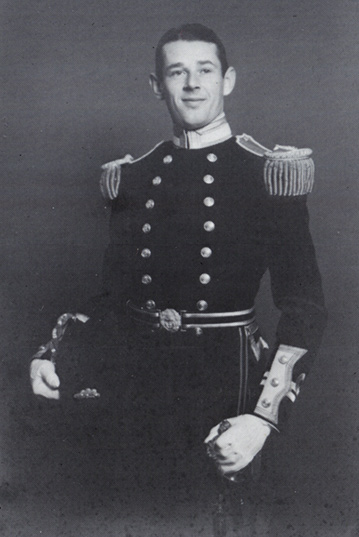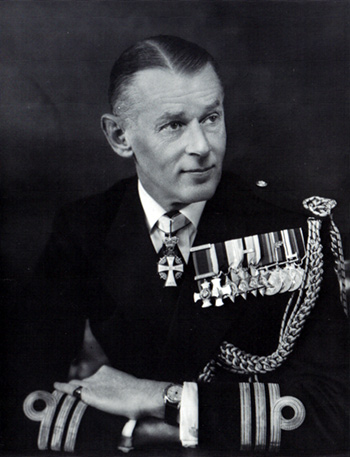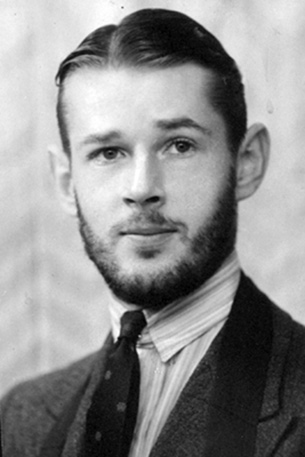






Cdr David H. Maitland-Makgill-Crichton RN,
the son of a Lt Cdr James H. Maitland-Makgill-Crichton RN, was was born on October 11th 1910, and brought
up in England by his South African Mother when his parents divorced and
his father emigrated to Australia. He went to Dartmouth in 1924 and
then served for three years on two of the Navy's big ships, the
battleship, HMS Resolution and the cruiser HMS Enterprise, and in 1930 was a Sub Lt on the Royal Yacht, The Victoria and Albert.
He was First Lieutenant on the destroyer, HMS Express, at Dunkirk and was awarded the DSC. His Captain was killed two weeks later when Express
hit a mine off the Dutch coast and lost its bows. Crichton took command
and brought her back to port stern first navigating by the stars. He
was appointed CO of HMS Boreas in November 1940 and of HMS Ithuriel in February 1942 and was awarded the DSO in June for his part in Operation Harpoon, a convoy to Malta. On the 12 August Ithuriel forced the Italian submarine, Cobalto,
to the surface and then sank it by ramming, a spectacular sinking not
appreciated by his senior officer who thought the Italian sub was
finished and there was no need to risk his ship by ramming. After repairs at Liverpool and Portsmouth Ithuriel returned
to the Mediterranean in time for the landings in Algeria but on the 27
November 1942 was so badly damaged by bombing at Bone that she was
beyond repair.
The appointment of this senior officer as CO of the
elderly V&W Class destroyer, HMS Venomous,
may have been due to plans to reinforce her bow with concrete, pack her
with explosives and ram the drydock of a French Vichy port in north
Africa, an operation
planned but cancelled. His officers respected his expertise at ship
handling but sensed he thought himself too good for Venomous
but the men admired "four gun Crichton" and "would do anything for
him". After two comparatively uneventful months he was replaced as CO
by Lt Henry D. Durell RN on the 16 February 1943.
For the rest of the war he was on the staff of the CiC Levant, HMS Nile, the RN shore base in Alexandria. He had a natural talent for languages, able to master one a year and eventually speaking forty. The Navy made good use of this rare ability in Egypt and during the postwar years in London and Scotland where he was Head of the Joint Services School of Languages (JSSL) at Crail in Fife.
****************
This
pen portrait of Cdr David H. Maitland-Makgill-Crichton RN is based on information provided
by Alan Fleischmann and Ginny Dodds with minor
additions by Bill Forster. It draws heavily on his obituary in The Telegraph which was included in The Telegraph's Book of Naval Obituaries. 2006.

 "We
asked the Earl of Lauderdale, Chief of Clan Maitland, if he knew
anything of David Maitland-Makgill-Crichton, the CO of HMS Venomous in 1943.
"We
asked the Earl of Lauderdale, Chief of Clan Maitland, if he knew
anything of David Maitland-Makgill-Crichton, the CO of HMS Venomous in 1943.
Research led to David’s sister Bunty Chambers (died 2004) who emigrated to America in 1987 with her younger daughter Vanessa, her son-in-law Dr. Alan Fleischmann and their children. We finally traced Virginia Dodd.known as Ginny, Bunty's elder daughter, living in London and was sent several photographs.
Cdr. David Maitland-Makgill-Crichton RN was the son of Lt Cdr James H Maitland-Makgill-Crichton. Born on October 11th 1910 his parents divorced and his father emigrated to Australia. He was brought up in London by his South African mother.
He went to Dartmouth in 1924 and then served for three years on two of the Navy’s big ships, the battleship HMS Resolution and the cruiser HMS Enterprise. In 1930 he was a Sub Lt on the Royal Yacht The Victoria and Albert.
David
was regarded as a flamboyant personality. Considered a dashing
destroyer officer and notable “bon vivant,” he was known to his
contemporaries as “Champagne Charlie.” His award of the DSC was in
recognition of his conduct as Executive Officer of the E Class
destroyer HMS Express during the Dunkirk evacuations, and he was to
receive the DSO for his part in Operation Harpoon
in June 1942. Three
times mentioned in despatches, he was also a gifted linguist. Ginny
Dodds recalled that "his mother named her cats after his ships, in
particular I remember Boreas and Ithuriel but not a Venomous!"
He
was born on October 11th, 1910. His preparatory school was Langley
Place, St. Leonards in Sussex where he invented a language of
his own, “Crichtonian”, complete with vocabulary, a dictionary
and rules of grammar, which he spoke with his school friends. He was
very interested in American science fiction which he read avidly. He also had a large collection of Sexton
Blake detective stories. In accordance with family tradition he entered
the Royal Naval College, Dartmouth, in 1924 and was given the nickname
"Monkey" because he could shin up a rope quicker than anybody else.
In 1927, at the age of 17 he was appointed to the Royal Yacht, Victoria and Albert which was a much sought after position. King George V and Queen Mary and also the Prince of Wales (later to become Edward VIII) were on board during his Commission.
When serving in the East Indies in the early 1930’s, he injured his arm and contracted septicaemia. This being an excellent excuse for not shaving he asked and obtained permission to grow a beard which delighted him so much that he had a photograph taken. Though he had dark hair his beard was a mixture of brown, auburn, and gold. He was tall, trim, and blue eyed and in his youth was very much a lady's man.
During the Second World War he was frequently in action. In 1940, he was awarded a DSC (Distinguished Service Cross) for his part in the Evacuation of Dunkirk. At this time he was First Lieutenant of the mine laying destroyer, Express, one of the last two destroyers to leave Dunkirk Harbour Mole early on June 3rd. She made six trips in all, four to the Mole and two to the Beaches, rescuing more than 3,500 men. During the evacuation David never left the bridge day or night, for three days, keeping going on the stimulant benzedrine, through the incessant bombing.
Two weeks later the Express was part of the 20th Destroyer Flotilla which ran into an enemy mine field 40 miles off the Texel on the Dutch coast. The bows of the ship were blown off and the Captain was killed. With a bad scalp wound David took command, had the breach sealed with watertight bulkheads and brought the crippled vessel back to port sailing her stern first and navigating by the stars as nearly all the navigational equipment had been destroyed. When he entered Grimsby he was met by cheering crowds. For this exploit he was mentioned in despatches and received the personal congratulations of Lord Louis Mountbatten of Burma.
Promotion to Lt Commander and appointment as Commanding Officer of the destroyer HMS Boreas followed in November 1940. Boreas was sent to South Africa for convoy duties, returning to the UK in December for a refit, when David left her and was appointed to another destroyer, HMS Ithuriel in February 1942. She was still under construction in Barrow when he took command, and after a very brief work up in the Clyde, was sent to Gibraltar to participate in the hotly contested Malta convoys under severe air attack.
A further mention in despatches and the award of the DSO came for his conduct, in what was known as Operation Harpoon, a Convoy to the harassed Island of Malta. The Convoy was bombed on four successive nights and one Naval Officer stated categorically at David’s funeral that he with other officers and seamen owed their lives to David’s skill in manoeuvring his ship out of the line of fire.
In the August 1942, convoy to Malta (Operation Pedestal), Ithuriel on the afternoon of August 12th, detected the Italian submarine Cobalto and attacked with the full batch of depth charges. The U-boat was forced to surface. To prevent any possibility of further attack, David turned his ship and rammed the submarine abaft of the conning tower with what he described as “a delightful crunch”, sinking the submarine. Most of the crew were rescued. Amongst these was the Italian Captain who, wet and bedraggled was taken to the English Commander’s cabin. There he was kittted out in one of the Commander’s better spare outfits (much to his servant’s annoyance!). The Italian Captain, to his surprise, found the servant courteously offering him a glass of sherry and he was addressed in Italian by the destroyer’s Commander. A further Mention in Despatches followed in November. Having sustained substantial damage in the ramming, Ithuriel was repaired in Gibraltar to return to Liverpool for permanent repairs and then to Plymouth for a refit. David then took her back to the Mediterranean where she suffered serious damage from bombing whilst in harbour at Bone (Algeria). Two bombs exploded underneath her and broke her back in November 1942, putting the ship out of action until she was scrapped in 1944. David was then appointed to HMS Venomous in December 1942 as Commanding Officer.
He was known by the ship’s company of Venomous as “four gun Crichton” after he read himself in with: “I observe this vessel has only three guns and my last ship, Ithurial, had four guns so you will make up the shortage with enthusiasm and efficiency”.
His accomplished ship-handling abilities were immediately recognised by his junior officers. Midshipman Barney remembered:
Lt Cashman remembered another incident that testified to Maitland-Makgill-Crichton’s ship handling skills:
“Whilst we were doing a short refit at Gibraltar he and I had to go out to act as Pilots for some American Destroyers. As we came slowly down the harbour the American turned to me and said ‘say, where are the tugs’, my reply was ‘we don't use tugs to berth Destroyers’ whereupon he stopped the ship and said ‘say Lootenant I'm not putting this can alongside without tugs’. Eventually a couple of fussy little dockyard tugs came out and pushed her and her sister ship into the berth alongside each other.
The following day we went out on a trial and on return were told to berth astern of the two Americans. We came in the Northern Entrance, down the harbour at the maximum speed allowed and alongside in three engine movements. If I remember rightly the CO asked his two American opposite numbers over for a drink.”
He was very popular with the men and according to Alex Campbell, who spent five months on Venomous as a Commissioned Warrant (CW) candidate “the crew would do anything for him”. He organised keep fit classes and treasure hunts on deck, on one occasion with a “piece of bacon” as a prize, and made the officers join in. Harry Haddon recalled that he stopped the ship dead, out of sight of land, and announced “hands to bathe”. Rope ladders and nets were dropped over the side and, without a boat being lowered, crew members not on duty jumped overboard for a swim; a non swimmer was lowered into the water on the end of a rope. William Collister described him approvingly as “very senior and an absolute toff”.
It was at this time that Venomous’ bows were reinforced with concrete. There had been a plan to use her to break her way into one of the disputed French ports by ramming the dock gates. Having rammed and sunk the Italian submarine Cobalto, Maitland-Makgill-Crichton certainly had the qualifications for the job but the need never arose. However, Venomous would retain her ‘ram’ until she went to the breaker’s yard.
It was here that Midshipman Stephen Barney finally caught up with his ship. He was photographed at the book launch for the new edition of A Hard Fought Ship (2017) on the 9 May but died on the 23 September. He described his first meeting with Cdr Maitland-Makgill-Crichton:
The return to Gibraltar on l6 February 1943 brought to an end Maitland-Makgill-Crichton’s short period in command. He was sent to the staff of the Commander in Chief in Alexandria, promoted to Commander in June 1944, and serving there until the end of the war.
Unexpectedly, he was sent to sea again in 1945 with the distasteful duty of commanding a destroyer patrolling the coasts of Palestine to intercept Jewish refugee ships, and then a spell as the Executive Officer of the Cruiser Gambia in the Far East.
From 1946 came a number of land based appointments for the Naval Intelligence which gave him an opportunity to extend his already great knowledge of languages. For two years he served as Naval Attaché in Copenhagen. Subsequently he acted as Personal Equerry to the King and Queen of Denmark when they made a State Visit to England in 1951 and attended a State Banquet at Buckingham Palace with them. This was the first time David had eaten off gold plates and he remarked how rapidly the food had gone cold! He was awarded one of the highest Danish awards, the Cross of Dannebrog (K af D). On another occasion he served in a similar capacity to President Kekkonen of Finland when the latter made his State Visit to Britain.
In 1948, he was at the Admiralty when the story broke of HMS Amethyst’s dramatic escape down the Yangtse River in what has become known as the famous Yangtse Incident. More and more in those post war years the Admiralty came to make use of his linguistic abilities and he paid courtesy visits to the ships of the British, German, Spanish, French and Polish Navies.

 In 1955, he took a Russian language course at London University and in
1956, he acted as an Interpreter for the visit of the Soviet leaders
Kruschev and Bulganin to Portsmouth. In his Naval capacity David was
attending a meeting of high ranking British and Soviet Naval Officers
when a message was brought to the Soviet admirals of the Commander
Crabbe incident (Crabbe was an expert frogman who was killed when
surreptitiously investigating the hull of the Russian cruiser in which
the Soviet leaders had travelled to Portsmouth). The Russian Naval
Chiefs angrily asked the British Admirals whether they knew about the
incident and the British denied all knowledge (it had been a covert
operation staged by the secret service). The Russians’ interpreter,
however, apparently deliberately misinterpreted their reply to convey
that they did have knowledge of it, but David quickly intervened in
Russian to correct this misinterpretation.
In 1955, he took a Russian language course at London University and in
1956, he acted as an Interpreter for the visit of the Soviet leaders
Kruschev and Bulganin to Portsmouth. In his Naval capacity David was
attending a meeting of high ranking British and Soviet Naval Officers
when a message was brought to the Soviet admirals of the Commander
Crabbe incident (Crabbe was an expert frogman who was killed when
surreptitiously investigating the hull of the Russian cruiser in which
the Soviet leaders had travelled to Portsmouth). The Russian Naval
Chiefs angrily asked the British Admirals whether they knew about the
incident and the British denied all knowledge (it had been a covert
operation staged by the secret service). The Russians’ interpreter,
however, apparently deliberately misinterpreted their reply to convey
that they did have knowledge of it, but David quickly intervened in
Russian to correct this misinterpretation.
In 1957, he became head of the Joint Services School of Languages (JSSL) at Crail in Fife, Scotland, earning the respect and admiration of many future translators and interpreters of Russian. Lieut.-Commander Stanley Minett who was one of David’s officer-students in Crail and subsequently his First Lieutenant prior to succeeding him in his job as Officer-in-Charge of the Naval wing described him as “the most courteous and considerate officer that I met in all my career” and said that “he won the respect and affection of everyone with whom he came in contact”.
In 1961, he was called as an expert witness in the trial of Peter and Helen Kruger, part of the so called Portland Spy Ring, which was stealing British Naval secrets. The Krugers were transmitting their messages by radio from their suburban house in Ruislip. David was able to show anomalies in the transcript of some of the messages indicating they were based on Russian and not English meanings. One example was that the apparently innocuous word “radiator” meant “transmitter” in Russian.
The latter part of his Naval career, prior to his retirement in 1964, was spent in the Ministry of Defence and in Naval Intelligence in Admiralty Arch in London.
When David retired from the Navy he became an incorporated linguist. He had studied languages all his life and he and Georg Schmidt of America were regarded as the leading linguists in the world. They both translated from forty source languages. David knew every European language with the exception of Welsh, Gaelic and Erse. He was a fellow of the Institute of Linguists and served on the Institute’s Council from 1964 to 1966. During the same period he was also Chairman of the Translators’ Guild Committee of the Institute and he helped to evolve the table of fees on which translation charges came to be based. He was a member of the Frinton Society which was for former Royal Navy Interpreters of Russian. He was one of the original members of the Institute of Translation and Interpreting when it was established in April 1966.
He continued to learn new languages at the rate of one a year, either through private study or through Berlitz courses. His astonishing memory was allied to a brilliantly analytical mind, enabling him to acquire new languages by comparing contrasting structures with those he already knew.
He lived with his mother at High Wray House at 135 Fishpool Street, St. Albans, a beautiful old building with extensive grounds (now renamed Manor Garden House), until her death in 1972 when he moved to 18 Avenue Road at the other end of town. In 1978 he moved to Charfield House in Whetstone, North London, at the suggestion of his sister Bunty and her husband Vernon Chambers. Their combined household comprised David, Bunty and Vernon, his niece Vanessa and her husband Alan Fleischmann together with Dorothy Pipe-Wolferstan, a longstanding friend of Bunty and Vernon’s, and David’s family retainer Mabel Lewington who had been in the service of David’s family for some sixty years. Charfield house was a large impressive neo-Georgian residence standing in beautiful grounds which lent itself admirably to being divided among such a large household.
For the last eight years of his life David acted as Languages Consultant to the translation company Protrans Limited, of Matthew Street, Dunstable and in 1986, became a Director of this company which was founded by his fiancee Mary Parsons.
Shortly
after moving to Charfield House David met and fell deeply in love with
Mary Parsons of Dunstable in Bedfordshire. As their romance developed
David wanted to be nearer to her and to live in a less communal way.
Charfield House was therefore sold and David went to live in Dunstable.
He became engaged to be married to Mary Parsons but shortly before this
could take place he developed cancer from which he died unmarried and
without issue on November 16th, 1987."
The scans of the photographs were supplied by his niece Ginny Dodd
| Top left: as a young man in dress uniform Lower left: in 1938 |
Top right: in dress uniform (undated). Right: in 1958 |